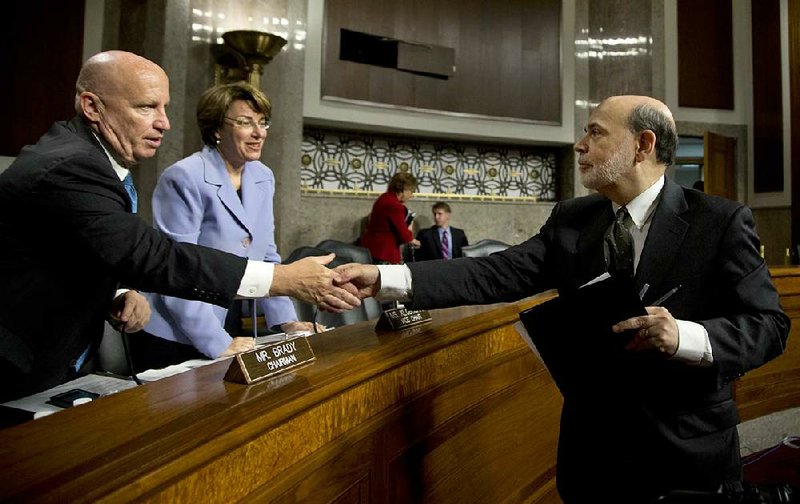WASHINGTON - Federal Reserve Chairman Ben Bernanke told Congress Wednesday that the U.S. job market remains weak and that it is too soon for the Fed to end its extraordinary stimulus programs.
Reducing the Fed’s efforts to keep borrowing rates low would “carry a substantial risk of slowing or ending the economic recovery,” Bernanke said in testimony to the Joint Economic Committee, a panel that includes members of the House and Senate.
Bernanke said the economy is growing moderately this year and unemployment has fallen to a four year low of 7.5 percent. Still, unemployment remains well above levels consistent with a healthy economy. And Bernanke said higher taxes and deep federal spending cuts are expected to slow economic growth this year.
“We’re trying to make an assessment of whether or not we’ve seen real and sustainable progress in the labor market outlook,” Bernanke told the committee.
His comments about the many risks facing the economy, along with the benefits gained so far from the Fed’s stimulus, suggest the Fed is not ready to taper bond purchases that have helped lower long-term interest rates to encourage more borrowing and spending.
William C. Dudley, president of the Federal Reserve Bank of New York, said in a Bloomberg TV interview that aired Wednesday that a decision on reducing the stimulus efforts still was three to four months away.
The Fed has said it plans to continue its $85 billion-a month in Treasury and mortgage bond purchases until the job market improves substantially. And after its April 30-May 1 meeting, the Fed said it could increase or decrease the pace depending on how the job market and inflation fare.
The panel’s chairman, Rep. Kevin Brady, R-Texas, criticized the Fed’s aggressive policies and pressed Bernanke to explain when the Fed might begin to reduce its bond purchases.
Bernanke said the Fed could take a “step down” if the job market shows “real and sustainable progress” over the next few meetings. When Brady asked if that could happen before Labor Day, Bernanke said, “I don’t know, it will depend on the data.”
But Bernanke made clear that the Fed could reverse course and increase its purchases if the economy began to falter. “We could raise or lower our purchases going forward,” Bernanke said.
In recent months, the job market and the broader economy have strengthened. The economy has added an average of 208,000 jobs a month since November. That’s up from only 138,000 a month in the previous six months.
Those gains, in part, are why critics of the bond purchases, including some Fed regional bank presidents, have questioned the need to continue them at their current pace. They argue that keeping interest rates too low for too long could send inflation surging or inflate dangerous bubbles in assets such as stocks or real estate. Such a bubble could burst with the same destabilizing effects that the housing bust caused.
Bernanke has had solid support for the bond purchases among the voting members of the Fed’s interest-rate setting committee. At each of the Fed’s three policy meetings this year, the committee has approved the purchases 11-1.
Many Federal Reserve officials agree that more progress in the labor market is needed before deciding to slow the pace of asset purchases, according to minutes of their last meeting.
“Most observed that the outlook for the labor market had shown progress” since the-bond buying program began in September, according to the record of the April 30-May 1 gathering released Wednesday in Washington. “But many of these participants indicated that continued progress, more confidence in the outlook, or diminished downside risks would be required before slowing the pace of purchases would become appropriate.” Information for this article was contributed by Martin Crutsinger of The Associated Press, Jim Puzzanghera of the Los Angeles Times and Jeff Kearns and Joshua Zumbrun of Bloomberg News.
Business, Pages 27 on 05/23/2013

